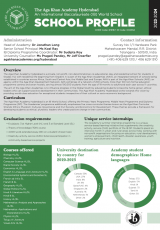Student publishes university research paper
Swethana Pothula is a senior at the Aga Khan Academy in Hyderabad. Over a period of three months, she published her own research paper titled "Inside the mind of a Rapist, in the context of India" with the help of Vijaybhoomi University. The research paper was published in the second edition of the IDEAS journal.
Over the course of three months, she was assigned a university Professor, Ms Poulami Banerjee, who helped oversee the process and guide her through it. Starting the process in July and running it all the way through September, she gained a deeper understanding of not only her topic but the process of publishing and research. Even though a lot of the timeline of publishing the research paper overlapped with her school work, Swethana really enjoyed the process of putting it together, and the continuous support from the professor made it easier for her.
Swethana has taken away a lot from this experience in terms of understanding the research process and building on her interests in Criminology, which she later wishes to pursue. The process of understanding and researching this topic familiarized her with this subject and gave her a deeper understanding of the same.
While considering a topic as sensitive and important as rape in a country like India, Swethana strongly thinks understanding the psyche and thought process of a rapist is the start to eliminating it: digging into the root cause and trigger in the mind of a rapist is crucial. While there is usually a lot of action after the crime is committed, Swethana looks into the start of it all in the mind. The change in conduct, thoughts and actions are early signs that need to be observed, so the threat is eliminated at an early stage.
Swethana wishes for anyone reading the research paper to really understand the influence of external factors and surroundings on a person that lead to their abnormal behaviour. The research paper gives you insight into behaving with and around a challenged person and identifying abnormal behaviour that will eventually lead to making them seek help before it’s too late.
Swethana is extremely grateful for the help she received through the process and also holds pride in having her own research paper published in a prestigious university journal. She strongly believes it is important to have these uncomfortable conversations on sensitive issues and address them.
Interviewed by Siddharth Deveneni, Diploma Programme One





